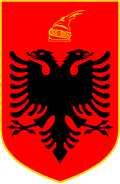| Number | Party | Acronym | Chairman | Coalition |
|---|
| 1 | Fryma e Re Demokratike | FRD | Bamir Topi | – |
| 2 | Partia Demokracia e Re Europiane | PDRE | Koci Tahiri | Shpresa për Ndryshim |
| 3 | Partia Balli Kombëtar Shqiptar | PBK | Adriatik Alimadhi | Shpresa për Ndryshim |
| 4 | Partia Bashkimi Liberal Demokrat | BLD | Arian Starova | Shpresa për Ndryshim |
| 5 | Aleanca Kuq e Zi | AK | Lumturi Ratkoceri | Shpresa për Ndryshim |
| 6 | Partia Ora e Shqiperise | POSH | Zef Shtjefni | Shpresa për Ndryshim |
| 7 | Partia Emigracionit Shqiptar | PESH | Kostaq Papa | Shpresa për Ndryshim |
| 8 | Partia Komuniste e Shqipërisë | PKSH | Qemal Cicollari | – |
| 9 | Partia Personat me Aftesi te Kufizuar | PPAK | Gjovalin Shqalshi | – |
| 10 | Aleanca për Barazi dhe Drejtësi Europiane | ABDE | Valentino Mustaka | Aleanca për Shqipërinë Europiane |
| 11 | Partia Aleanca Arbnore Kombetare | AAK | Gjet Ndoj | Aleanca për Shqipërinë Europiane |
| 12 | Partia Demokracia Sociale e Shqipërisë | PDS | Paskal Milo | Aleanca për Shqipërinë Europiane |
| 13 | Partia Kristian Demokrate e Shqipërisë | PKD | Dhimiter Muslia | Aleanca për Shqipërinë Europiane |
| 14 | Partia Lëvizja Punëtore Shqiptare | PLPSH | Genc Sakaj | Aleanca për Shqipërinë Europiane |
| 15 | Partia e Pajtimit Kombëtar Shqiptar | PPK | Spartak Dobi | Aleanca për Shqipërinë Europiane |
| 16 | Partia e Gjelbër e Shqipërisë | PGJ | Edlir Petanaj | Aleanca për Shqipërinë Europiane |
| 17 | Partia G99 | G99 | Redi Shtino | Aleanca për Shqipërinë Europiane |
| 18 | Partia e Reformave Demokratike Shqiptare | PRDSH | Krenar Rryçi | Aleanca për Shqipërinë Europiane |
| 19 | Partia Aleanca Demokristiane | ADK | Zef Bushati | Aleanca për Shqipërinë Europiane |
| 20 | Partia Socialpunëtore Shqiptare | PSP | Ramadan Ndreka | Aleanca për Shqipërinë Europiane |
| 21 | Partia Aleanca për Demokraci dhe Solidaritet | ADS | Gaqo Apostoli | Aleanca për Shqipërinë Europiane |
| 22 | Partia për Mbrojtjen e të Drejtave të Emigrantëve e Shqipërisë | PMDE | Ymer Kurti | Aleanca për Shqipërinë Europiane |
| 23 | Partia Demokrate Per Integrim e Prosperitet | PDIP | Kujtim Muca | Aleanca për Shqipërinë Europiane |
| 24 | Partia Aleanca Demokratike | AD | Eduart Abazi | Aleanca për Shqipërinë Europiane |
| 25 | Partia Socialiste e Moderuar | PSM | Gjergj Koja | Aleanca për Shqipërinë Europiane |
| 26 | Partia Ardhmëria Shqiptare | PASH | Emin Subashi | Aleanca për Shqipërinë Europiane |
| 27 | Partia e Unitetit Kombëtar Shqipëtar | PUK | Idajet Beqiri | Aleanca për Shqipërinë Europiane |
| 28 | Partia Socialdemokrate e Shqipërisë | PSD | Engjell Bejtaj | Aleanca për Shqipërinë Europiane |
| 29 | Partia e të Drejtave të Mohuara | PDM | Ilir Vata | Aleanca për Shqipërinë Europiane |
| 30 | Partia Socialiste e Shqipërisë | PS | Edi Rama | Aleanca për Shqipërinë Europiane |
| 31 | Partia Aleanca Maqedonase për Integrimin Europian | AMIE | Edmond Themelko | – |
| 32 | Partia për Mbrojtjen e të Drejtave të Punëtorëve | PMDPSH | Kadri Isufaj | – |
| 33 | Partia Kombetare Konservatore | PKKA | Kujtim Gjuzi | – |
| 34 | Partia per Liri Demokraci dhe Etike | LDE | Arian Galdini | – |
| 35 | Raporti i auditimit për Partia Minoriteti Etnik Grek për të Ardhmen | MEGA | Kristo Kiço | – |
| 36 | Partia Bindja Demokratike | BD | Astrit Patozi | – |

